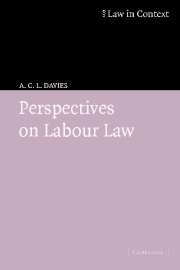Book contents
- Frontmatter
- Contents
- Preface
- Acknowledgements
- Table of statutes
- Table of statutory instruments
- Table of conventions and foreign legislation
- Table of cases
- Abbreviations
- Part I
- Part II
- 5 Who is protected by employment law?
- 6 Working time
- 7 Discrimination
- 8 Wages
- 9 Dismissal
- 10 Collective representation
- 11 Trade union membership
- 12 Industrial action
- What next?
- Index
6 - Working time
Published online by Cambridge University Press: 06 January 2010
- Frontmatter
- Contents
- Preface
- Acknowledgements
- Table of statutes
- Table of statutory instruments
- Table of conventions and foreign legislation
- Table of cases
- Abbreviations
- Part I
- Part II
- 5 Who is protected by employment law?
- 6 Working time
- 7 Discrimination
- 8 Wages
- 9 Dismissal
- 10 Collective representation
- 11 Trade union membership
- 12 Industrial action
- What next?
- Index
Summary
Working time has traditionally been regarded as a matter for collective bargaining or for managerial decision-making. Nowadays, three important aspects of working time are regulated by legislation. First, the Working Time Regulations 1998 (WTR 1998) seek to regulate the working time of all workers, by prescribing limits on the maximum number of hours which can be worked in the week and by requiring employers to give their workers daily and weekly rest breaks and annual holidays. Second, the law forbids discrimination against those who work part-time. Unless the employer can justify treating part-timers differently, it must give them the same benefits as full-timers. Third, the law provides various kinds of leave to enable employees to combine work and family life: maternity leave, paternity leave, parental leave and emergency leave. Parents may also ask for their employer's permission to work part-time or from home or in some other way which will assist them in fulfilling their family responsibilities.
In the international human rights instruments, there is a long-standing tradition of rights to reasonable limits on working hours and to paid holidays. Such rights have been framed as basic minimum standards which are necessary to ensure that all workers are treated fairly by their employers, or sometimes as an aspect of health and safety regulation. Maternity leave is also a well-established right.
- Type
- Chapter
- Information
- Perspectives on Labour Law , pp. 95 - 115Publisher: Cambridge University PressPrint publication year: 2004

